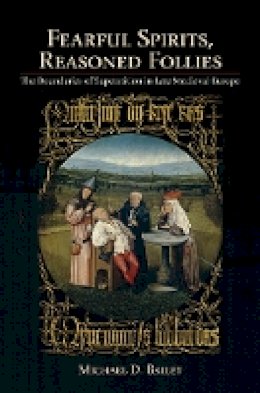Michael D. Bailey is Associate Professor of History at Iowa State University. He is the author of Battling Demons: Witchcraft, Heresy, and Reform in the Late Middle Ages; Historical Dictionary of Witchcraft; and Magic and Superstition in Europe: A Concise History from Antiquity to the Present.
Fearful Spirits, Unreasoned Follies is a groundbreaking work, suitable for graduate seminars and advanced undergraduate courses on premodern magic and witchcraft. It exemplifies why Bailey is one of the best scholars writing about the Middle Ages today. (The Catholic Historical Review) As Bailey elegantly points out, church authorities used superstition to promote proper religious devotion, and understanding these actions and beliefs is vital to understanding medieval culture and society. Basing his book upon a close reading of the primary sources, Bailey clearly explains the importance of superstition among the elite and in common practice during the late Middle Ages and explains how authorities sought to create a coherent theory of superstition to better control society. Summing Up: Highly recommended. (Choice) Bailey provides his reader with a broad overview of Christian thinking about superstition from the patristic period through to the fourteenth century. The complexity of the multiple meanings that inhered in the term is immediately apparent, but Bailey writes with an eye to the future, and particularly the emergence of what he sees as a new impetus in this long-standing discussion. (Renaissance Quarterly) Bailey writes clearly, without jargon and is excellent at noting changes in emphasis over time and differences between his sources without overplaying them. Yet he is far from being unreflective and concludes with a chapter explicitly pondering the trope of "modernity" and the role the concept of superstition has played in its construction. (Speculum) Bailey's approach to late medieval superstition highlights the challenges of determining what constitutes acceptable spiritual practice. He emphasizes that an exact definition of superstition may not exist: superstition itself is slippery and protean.... Bailey enriches his subject while expanding its relevance. (Fortean Times) This stimulating book traces a neglected thread in the Western intellectualtradition and challenges those modern prejudices and tropes of medievalsuperstition that are so irritating and offensive to historians of the period. Although the main focus of Michael Bailey's investigations is predominantly German writers of the fourteenth and fifteenth centuries, he placesthem within a discourse stretching back to the Romans and forward intoour own time.... Bailey is to be commended for approaching these complex issues from a fresh and provocative angle. Students of both science and witchcraft have much to ponder here. (Parergon - Journal of the Australian and New Zealand Association for Medieval and Early Modern Studies) As many scholars have pointed out, the differences between religion and superstition are in the eye of the beholder. Focusing largely on the works of French—and German—speaking theologians, Mark Bailey's detailed and readable new book argues that debates about this boundary were also important to medieval thinking. (the english historical review) The book's structure is clear, logical, and useful.... Bailey has addressed a very complicated topic with impressive skill, facing multiple difficulties with the subject matter head-on. His convincing argument regarding the changes in the meaning of "superstition" lead to one of the first statements of the conclusion, that "there is the abiding modern prejudice to view both the 'medieval' and the 'superstitious' as indicative of fundamentally immutable premodern irrationality.... This, then, is a much welcome book, useful to historians of both religion and magic alike. (The Journal of religion) Elegantly written and cogently argued, Bailey's book should be required reading for undergraduate and graduate students in a variety of fields, from European History and Religion to the History of Science. For scholars, Bailey has generously provided a wealth of material for further study in an Appendix of Late Medieval Sources Addressing Superstition. (magic, ritual, and witchcraft) Bailey draws on a range of theorists and specialists to contribute meaningfully to the deconstruction of that great scholarly irony: modernity.... It amused this reader greatly that through a study of medieval understandings of superstition, Bailey helps to show that modernity itself is every bit as shadowy a thing as are those werewolves of the forest. (Journal of Religious History)

